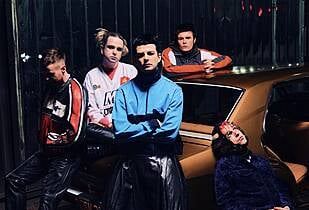- Music
- 02 Nov 15

McAlmont and Butler’s iconic ’90s hit ‘Yes’ soundtracked the celebrations following the affirmative vote in this year’s marriage referendum. They tell Eamon Sweeney about creating the classic tune, backstage encounters with U2 and why Britpop was a creative cul de sac.
McAlmont and Butler are over the moon. They’ve just spent the day listening to Irish press and radio folk enthusing about their 1995 calling card hit ‘Yes’ soundtracking the unbridled joy of Saturday, May 23rd. Just in case you’re just back from an intergalactic space expedition – that was the day the results rolled in from all over the country to pass the Marriage Equality referendum by a landslide.
“‘Yes’ really has had a fascinating post-’90s life,” reflects David McAlmont over mid- afternoon tea with his guitar legend band mate. “David Nyman rang me up the night before the Olympics saying they’d worked ‘Yes’ into the ceremony. Coventry football club use it at half time.”
“People always tell me that someone gave them that song as a romantic gesture, or they got married to it,” Bernard Butler adds. “To hear it was attached to such a wonderful and successful campaign makes us very proud indeed. For all these reasons, it makes ‘Yes’ my favourite song I’ve written.”
“I’ve let it go now because in many ways the song became bigger than us,” McAlmont continues. “Sometimes, people say things to me about that I don’t know what to say because they are so profound. I remember the producer of Top of the Pops introducing me to his sister. She had been incapacitated and ‘Yes’ gave her the strength to get up. When someone says that to you, there is not much you can say back. Women have told me that ‘Yes’ gave them the courage to walk away from abusive and violent relationships.”
“The real reason why we’re all sitting here talking today is because at some stage in our lives, music profoundly connected with us and became such a powerful thing,” Butler says. “I’ve teenage children now and I see it happening to them. We still need to absorb new and old music. It colours the whole experience of life. It is the opposite of conversation, but it is conversation. It can lift your mood, or help you get ready for a Saturday night.”
The duo have just re-released a 20th anniversary edition of their iconic debut album, The Sound of McAlmont and Butler. They plan to release new material in 2016, but first, they kickstart a European tour with a Vicar St show this weekend. “I know from past experience that Dublin is a dangerous place to get the party started,” McAlmont laughs. “If we make it to Glasgow for the second night, we’ll be doing well.”
It will be a sort of homecoming for Bernard Butler. “I spent my a lot of my childhood in Monkstown Farm in Dún Laoghaire” he reveals. “I spent every summer there. Dún Laoghaire wasn’t very nice in the ’70s, although I believe it has become very well to do. I still have family in Ballybrack.”
Dublin also brings back plenty of vivid memories of playing with Suede. ” The first time I played in Dublin in 1993, Adam Clayton and The Edge came along,” he recalls. “After the show, someone said he wanted to meet us. We all thought it was a wind up, so we said jokingly, “Tell him to fuck off!” About a year later, I went to see them at Wembley Stadium. I was brought into a room afterwards and The Edge said, ‘Are we OK about this now?’”
Speaking of Suede, Bernard Butler has nothing but good feelings for his former band. “I get on very well with all of them,” he reveals. “We’re all middle aged people now and there is no big deal. I really want them to do their thing, and I’m really comfortable not doing Suede anymore. I made some good records with Suede and I’m extremely proud of them, but if I hadn’t left all this never would have happened.”
Butler has mixed feelings about the giddy Britpop years. “It certainly wasn’t all great; Tony Blair getting in, lots of vulgar, macho music, flag waving and everyone being very gang-like. Looking back, a lot of it was very misguided. Everything got oversold and spoiled a little bit. It was not a representative England.”
“Some people refer to us as Britpop, but I don’t understand why,” McAlmont says. “When I think of Britpop, I think of Blur v Oasis. However, I do think of us as a British band. Not to put to put too fine a point on it, but an openly gay black man and a straight man making a big jolly noise together wasn’t going to come out of the States in the ’90s.”










